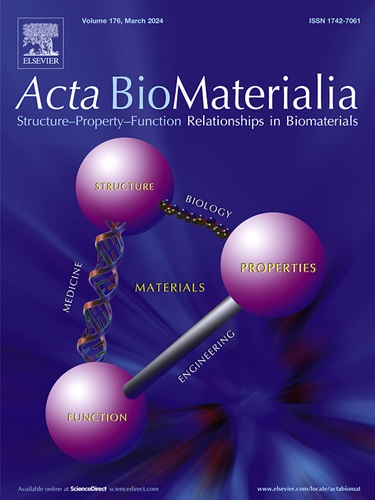IL-21R-Targeted Nano-immunosuppressant Prevents Acute Rejection in Allogeneic Transplantation by Blocking Maturation of T Follicular Helper Cells
IF 9.4
1区 医学
Q1 ENGINEERING, BIOMEDICAL
引用次数: 0
Abstract
During organ transplantation, immune rejection is a primary cause of graft failure. In the underlying pathophysiology of rejection, T follicular helper (Tfh) cells and interleukin-21 (IL-21) play pivotal roles. Tfh cells exacerbate the humoral immune response by promoting B cell differentiation and antibody production, which leads to damage of the transplanted tissue. IL-21, a key pro-inflammatory cytokine, binds to its receptor (IL-21R) to enhance both the growth and function of Tfh cells, while also further driving B cell activation and differentiation into plasma cells. Building on this knowledge, we have developed a tacrolimus-based nano-inhibitor designed to target Tfh cells. This nano-inhibitor is constructed using a mPEG-PLGA-PLL (PEAL) scaffold, with IL-21R monoclonal antibodies conjugated to its surface, and tacrolimus encapsulated within the structure. In vitro experiments demonstrated that this nano-inhibitor effectively targets Tfh cells, inhibiting the differentiation of naive CD4+ T cells into Tfh cells. In co-culture systems of T and B cells, it significantly suppresses the activation of both cell types, leading to a reduction in IgG antibody production. In vivo, the nano-inhibitor selectively targets secondary lymphoid organs, reduces systemic inflammation, minimizes lymphocyte infiltration into the graft, and induces immune tolerance toward the transplanted tissue. In addition, no significant toxicity was observed in vitro or in vivo. As a therapeutic agent that simultaneously modulates both T and B cell responses, we believe it holds significant promise for broader applications in transplantation immunotherapy.
Statement of Significance
This study presents a groundbreaking nano-immunosuppressant designed to target both T and B cells, addressing the critical challenge of acute rejection in allogeneic transplantation. By combining tacrolimus nanoparticles with IL-21 receptor antibodies, this immunosuppressant effectively suppresses Tfh cell proliferation and B cell activation, significantly reducing IgG generation. The formulation enhances tacrolimus's bioavailability, minimizes off-target toxicity, and overcomes its narrow therapeutic window. In vitro and in vivo studies show reduced lymphocyte infiltration, lower inflammatory markers, and decreased nephrotoxicity compared to conventional tacrolimus.
靶向il - 21r的纳米免疫抑制剂通过阻断T滤泡辅助细胞成熟防止同种异体移植急性排斥反应。
在器官移植过程中,免疫排斥反应是移植失败的主要原因。在排斥反应的潜在病理生理中,T滤泡辅助细胞(Tfh)和白细胞介素-21 (IL-21)起着关键作用。Tfh细胞通过促进B细胞分化和抗体产生而加剧体液免疫反应,从而导致移植组织的损伤。IL-21是一种关键的促炎细胞因子,它与其受体IL-21R结合,促进Tfh细胞的生长和功能,同时进一步推动B细胞活化并分化为浆细胞。基于这些知识,我们开发了一种以他克莫司为基础的纳米抑制剂,旨在靶向Tfh细胞。该纳米抑制剂使用mPEG-PLGA-PLL (PEAL)支架构建,其表面偶联IL-21R单克隆抗体,他克莫司包被在结构内。体外实验表明,该纳米抑制剂能有效靶向Tfh细胞,抑制幼稚CD4+ T细胞向Tfh细胞的分化。在T细胞和B细胞共培养系统中,它显著抑制两种细胞类型的激活,导致IgG抗体产生减少。在体内,纳米抑制剂选择性地靶向二级淋巴器官,减少全身炎症,最大限度地减少淋巴细胞对移植物的浸润,并诱导对移植组织的免疫耐受。此外,在体外和体内均未观察到明显的毒性。作为一种同时调节T细胞和B细胞反应的治疗剂,我们相信它在移植免疫治疗中具有更广泛的应用前景。意义声明:本研究提出了一种开创性的纳米免疫抑制剂,旨在同时靶向T细胞和B细胞,解决同种异体移植急性排斥反应的关键挑战。通过将他克莫司纳米颗粒与IL-21受体抗体联合使用,该免疫抑制剂可有效抑制Tfh细胞增殖和B细胞活化,显著减少IgG的产生。该制剂提高了他克莫司的生物利用度,最大限度地减少了脱靶毒性,并克服了其狭窄的治疗窗口。体外和体内研究表明,与传统的他克莫司相比,它减少了淋巴细胞浸润,降低了炎症标志物,降低了肾毒性。
本文章由计算机程序翻译,如有差异,请以英文原文为准。
求助全文
约1分钟内获得全文
求助全文
来源期刊

Acta Biomaterialia
工程技术-材料科学:生物材料
CiteScore
16.80
自引率
3.10%
发文量
776
审稿时长
30 days
期刊介绍:
Acta Biomaterialia is a monthly peer-reviewed scientific journal published by Elsevier. The journal was established in January 2005. The editor-in-chief is W.R. Wagner (University of Pittsburgh). The journal covers research in biomaterials science, including the interrelationship of biomaterial structure and function from macroscale to nanoscale. Topical coverage includes biomedical and biocompatible materials.
 求助内容:
求助内容: 应助结果提醒方式:
应助结果提醒方式:


